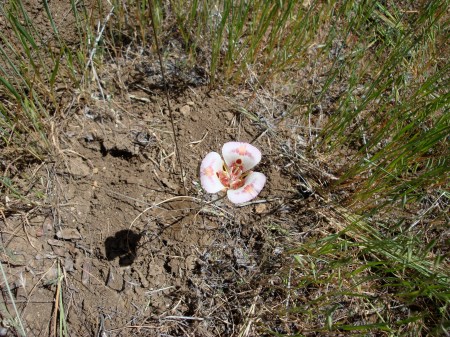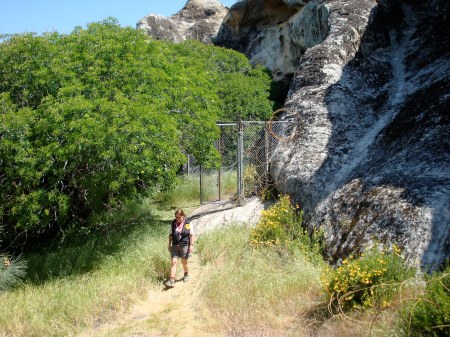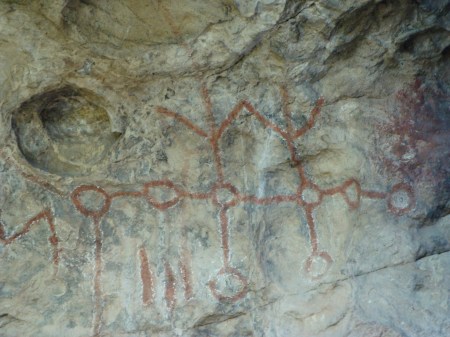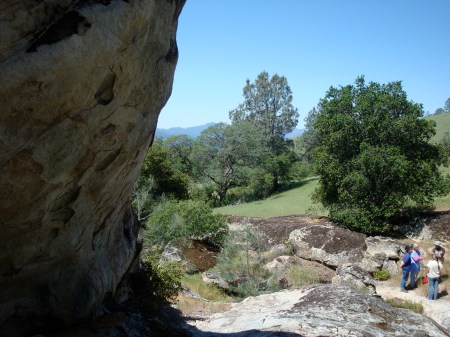The army hasn’t allowed the public to visit La Cueva Pintada (on Fort Hunter Liggett) in something like 10 years, so when the San Antonio Valley Historical Association succeeded in navigating the bureaucratic maze and getting permission for a public tour a lot of people jumped at the opportunity. A lot more people than the Historical Association had been counting on. They’d told the army they’d be bringing about 20 people – but closer to 150 of us showed up. This initially caused a lot of consternation and high blood pressure among our hosts, but everyone, we’re glad to say, was eventually allowed to proceed to the cave. The guys on the right are taking pictures of a Mariposa Lily.
Here’s the Mariposa Lily (Calochortus sp.)
Walking to the cave
The cave entrance complete with chain link fence and concertina wire (this is the army, after all).
The walls are absolutely covered with the prehistoric art that gives the cave its name.
A lot of people have tried to decipher the meaning of these images, but we suspect their guesses reveal more about themselves than about the people who did the painting.
Deeper in the cave the walls are more fire-blackened and the art sometimes better preserved.
On some parts of the wall the images overlap one another to the point that it’s hard to tell what’s what. This woman has been hired to help demystify the situation by doing careful sketches of individual images. One (quite possibly apochrophal) story we’ve heard is that the paintings in this cave escaped destruction during the taliban mission era, due to the presence of this cross.
There’s definitely enough to keep her busy for awhile …
Interesting how different this art is …
From the famous images in the caves near Tassajara.
View of Cone Peak from the cave entrance.
A close-up of the Sticky Monkey-Flower (Mimulus aurantiacus) growing by the gate.













Oh, wow!! What an opportunity! Thanks for preserving it and sharing it with us.
The Mariposa Lily is the Calochortus venustus, I believe.
Anybody know if a reliable date for these pictographs has been established?
The pictographs have not been dated directly or indirectly. However, there are several ages reflected. It is likely that the production of the paintings took place over the last 1,000 years.
Taliban?
You really are an idiot…
Would be interesting to watch what the actual Taliban would do to someone like you
You’re right. We should never have implied an equivalence between the Taliban and the mission fathers. While both were inspired by religion to establish murderous regimes, violently subjugate women, and destroy priceless cultural treasures, the Taliban have never stooped to the level of committing genocide. We apologize.
I first visited these caves when I was 5 or 6 years old, before I knew there were disciplines called archaeology and anthropology. Back then (in the early/mid-1960s) you could drive very close to the caves. We spent an afternoon exploring the caves, touching the paintings and wondering about the people who made them.
I have a vague memory of driving to the top of Pine Canyon Road and cutting through Ft. Hunter Liggett. For the drive home, we continued on to Mission San Antonio de Padua and then home via Jolon Rd. We did not stop at the mission; my fist visit to the mission would have to wait until I was 9 years old, in the 4th grade, when we were bussed to the mission and given a docent-lead tour.
I next saw the caves sometime in the 1970s, after the fence had been put up.
It is so sad that there is no longer access to this important piece of local history, but of course people would screw things up by defacing the paintings and leaving their own lame-ass mark. Even though over a half-century has passed, I still remember the otherworldly energy of the place, the serenity, and the unspoiled beauty of it all.
I would love to be included in the next tour.
I was a military policeman at hunter liggett military reservation (now ft hunter liggett), from December 1974 to October 1975 and found the painted cave by pure chance. The pictures are identical to the photos I still have.
At that time there was no fencing or barriers of ankle kind and we were free to explore the cave. I believe there was another MP that removed and kept some type of broken pottery, I remember telling him to leave it and not to disturb anything, but he kept it. Beautiful country…I told my boss “LTZ”, for lieutenant Zerrison…(spelling could be wrong), that I’d stay in the army for 30 years if I could stay here for the whole time.
The locals who converted said they should destroy the caves due to idolatry. However, the padres said no because of the Christian cross, that predated the Portola expedition and founding of Mission San Antonio de Padua, in La Cueva Pintada. See pp. 9-12 of “Padres and People” by Beatrice Casey.
I was stationed at Ft Ord 1990 – 1993. I flew medevac and part of our mission was to provide on station coverage for Hunter-Liggett. What this meant was I got to spend a lot of time flying around during duty and lots of time mountain biking around while off duty. The cave was a regular stop for us – it was fenced, but we could get a key at the operations center. I have biked up and explored and we flew up and explored. I agree with Chris’ statement above – really goes for Ft Ord as well.
I’m always fascinated when it comes to this topic. If only I knew this was happening at the time I would of joined the tour.
I was a US Army military policeman station that Hunter Liggett Military Reservation, now Fort Hunter Liggett from December 1974-October 1975. At that time the cave had no fencing or barricades at all, in fact, the only thing was a sign saying authorized personnel authorized personnel only. MP’s go anywhere they want, right or wrong, and in the early summer of 1975 we came across that sign and investigated and found the painted cave, we walked inside, took many pictures of which I still have some photos, and found some artifacts which we picked up, looked at and put right down, we also noticed that there were like areas to eat that had the bowls carved right into the rock so our guess was to put the food in that and then eat it out of that or it could be to hold water or whatever. They were only a few military policeman that knew of this location and in fact 99% of the personnel at a Hunter Liggett knew absolutely nothing of it, which is probably why it was still in good shape. It’s too bad that we have individuals that would destroy humanity‘s legacy.